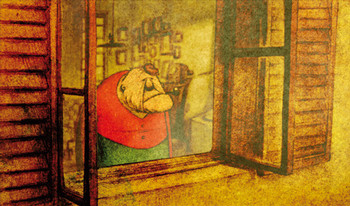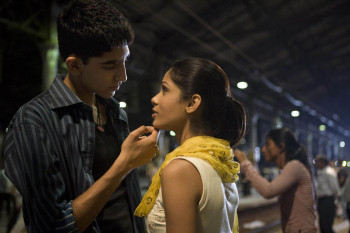Twitter Review: Battlestar Galactica Season 1
‘Battlestar Galactica S1’ – After the brisk miniseries, this was a long haul with an admittedly superior cliffhanger. Tigh must die — now.
‘Battlestar Galactica S1’ – After the brisk miniseries, this was a long haul with an admittedly superior cliffhanger. Tigh must die — now.
‘Encounters at the End of the World’ – By turns tedious and fascinating, Herzog’s doc resembles the doomed penguin walking to the mountains.
‘Zodiac’ – Subtly but thoroughly subversive and odd, Fincher’s procedural is radical in construction but goes down easily. A quiet triumph.
 I’ll start with an admonition: You have no reason not to have a horse in the short-film categories for the Oscars. These should be your favorite races, because they require relatively small investments of time. If you see and hate The Reader, you’ve lost 124 minutes of your life. If you see and hate Lavatory – Lovestory, you’re out 10 minutes. And the chances of you hating Lavatory – Lovestory are much smaller. Alas, each has about the same chance of winning the top prize in its category.
I’ll start with an admonition: You have no reason not to have a horse in the short-film categories for the Oscars. These should be your favorite races, because they require relatively small investments of time. If you see and hate The Reader, you’ve lost 124 minutes of your life. If you see and hate Lavatory – Lovestory, you’re out 10 minutes. And the chances of you hating Lavatory – Lovestory are much smaller. Alas, each has about the same chance of winning the top prize in its category.
‘The Strangers’ – Expert, brutal, pointless, and a good student of its elders. 77 minutes, and 70 pass before the creeps commit bodily harm.
 Rotten Tomatoes has a feature called “Average Tomatometer by Year,” and the default screen for Renée Zellweger looks grim. From 2005 to 2009, her score drops for two years (from 80 to 52), recovers a little (to 64), and falls off a cliff (to 19). This is completely meaningless, of course. If you expand the time frame, the line jumps up and down mercilessly. If you’ve ever heard of the trouble with a “small sample size,” this is prime evidence, with most actors being in one or two movies a year. And Renée is but one person in movies containing (and made by) multitudes. Still, there’s the sneaking suspicion that Ms. Zellweger is on a downward trajectory.
Rotten Tomatoes has a feature called “Average Tomatometer by Year,” and the default screen for Renée Zellweger looks grim. From 2005 to 2009, her score drops for two years (from 80 to 52), recovers a little (to 64), and falls off a cliff (to 19). This is completely meaningless, of course. If you expand the time frame, the line jumps up and down mercilessly. If you’ve ever heard of the trouble with a “small sample size,” this is prime evidence, with most actors being in one or two movies a year. And Renée is but one person in movies containing (and made by) multitudes. Still, there’s the sneaking suspicion that Ms. Zellweger is on a downward trajectory.
‘Planet Terror’ – Not nearly bad enough to be a true homage; despite the charming scratches etc., it’s far too polished and winking to work.
 Slumdog Millionaire has slipped in and out of the Box Office Power Rankings since the weekend starting December 19 – spending four of those weeks in the rankings and two weeks out. It seems telling that this past weekend, Millionaire again came out on top of our rankings, five weeks after it initially won. In both cases, Slumdog’s victory accompanied a significant increase in the number of venues at which the movie was playing – 169 to 589 on December 19, and 582 to 1,411 on January 23. But there’s also evidence that the Danny Boyle-directed movie has been able to maintain public interest and enthusiasm over an extended period of time, beyond simply expanding its release.
Slumdog Millionaire has slipped in and out of the Box Office Power Rankings since the weekend starting December 19 – spending four of those weeks in the rankings and two weeks out. It seems telling that this past weekend, Millionaire again came out on top of our rankings, five weeks after it initially won. In both cases, Slumdog’s victory accompanied a significant increase in the number of venues at which the movie was playing – 169 to 589 on December 19, and 582 to 1,411 on January 23. But there’s also evidence that the Danny Boyle-directed movie has been able to maintain public interest and enthusiasm over an extended period of time, beyond simply expanding its release.
 When people talk about Oscar snubs, they’re usually speaking emotionally. But we can quantify snubs, at least when it comes to Best Picture. You’ll need to accept one major assumption: that critics in the aggregate are good arbiters of the quality of films. Here is a list of movies – the Best Picture nominees, other serious contenders, and a few never-weres – ranked by their combined scores from Rotten Tomatoes and Metacritic.
When people talk about Oscar snubs, they’re usually speaking emotionally. But we can quantify snubs, at least when it comes to Best Picture. You’ll need to accept one major assumption: that critics in the aggregate are good arbiters of the quality of films. Here is a list of movies – the Best Picture nominees, other serious contenders, and a few never-weres – ranked by their combined scores from Rotten Tomatoes and Metacritic.
 A reliable rule for critical aggregators is that Rotten Tomatoes will almost always be a more extreme number than Metacritic. Put another way, the Metacritic number will generally sit between the Rotten Tomatoes number and 50. This is a function of the up-or-down Rotten Tomaotes system compared to the shadings allowed by Metacritic. (A three-star review is fully positive to Rotten Tomatoes, but only three-quarters positive to Metacritic.) There are so few significant exceptions that it’s worth noting when they crop up. In this week’s Box Office Power Rankings (won, for a second consecutive week, by Gran Torino), there are two: Notorious and Defiance. They both scored 52 at Rotten Tomatoes and significantly higher (61 and 58, respectively) at Metacritic. The obvious explanation is that while critics were roughly evenly split on the movies, those who liked it liked it more than those who didn’t like it didn’t like it. Less stupidly, each got marginally negative reviews and enthusiastic positive ones in equal measure. But I wonder if these special cases speak to some sort of critical fear.
A reliable rule for critical aggregators is that Rotten Tomatoes will almost always be a more extreme number than Metacritic. Put another way, the Metacritic number will generally sit between the Rotten Tomatoes number and 50. This is a function of the up-or-down Rotten Tomaotes system compared to the shadings allowed by Metacritic. (A three-star review is fully positive to Rotten Tomatoes, but only three-quarters positive to Metacritic.) There are so few significant exceptions that it’s worth noting when they crop up. In this week’s Box Office Power Rankings (won, for a second consecutive week, by Gran Torino), there are two: Notorious and Defiance. They both scored 52 at Rotten Tomatoes and significantly higher (61 and 58, respectively) at Metacritic. The obvious explanation is that while critics were roughly evenly split on the movies, those who liked it liked it more than those who didn’t like it didn’t like it. Less stupidly, each got marginally negative reviews and enthusiastic positive ones in equal measure. But I wonder if these special cases speak to some sort of critical fear.